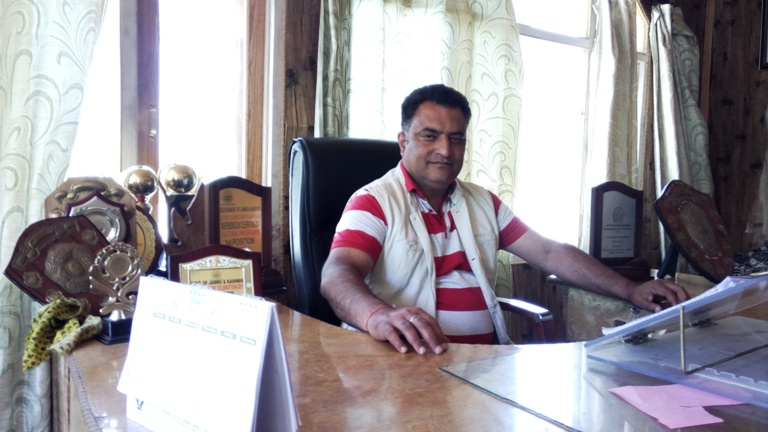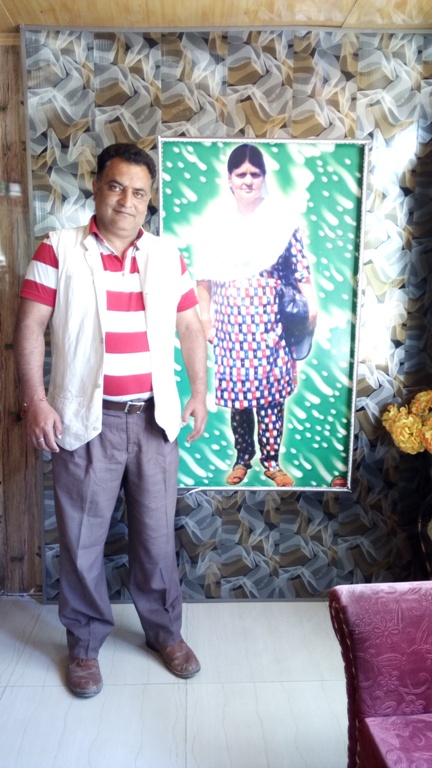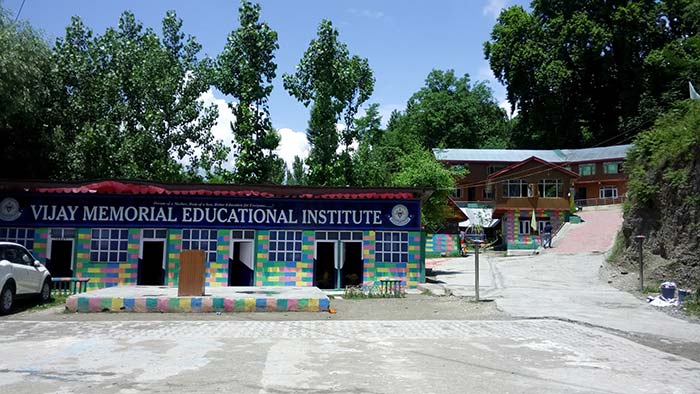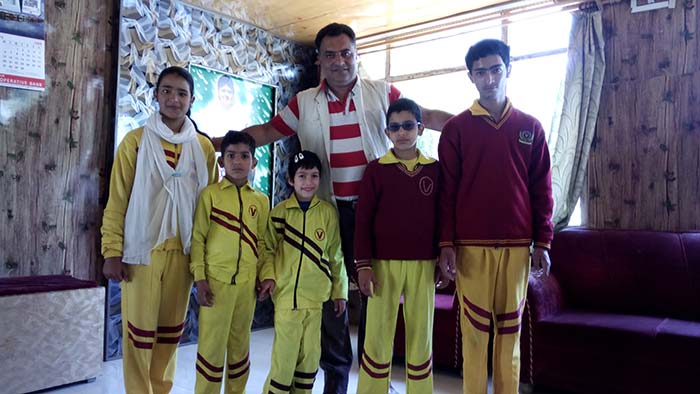At a time when Pandit Township controversy is snowballing into a major crisis in J&K, a Kashmiri Hindu who stayed put in valley during turbulent nineties when his ilk deserted it has emerged a new role model in Kashmir’s educational sector. Today, Sanjay Verma is name whose style of schooling has made him a role model in Central Kashmir’s Ganderbal, reports Bilal Handoo

He recalls it a distress call that buzzed him on May 14, 2016. It came from a top cop informing this known Kashmiri Hindu of Ganderbal about passing of a Kashmiri Pandit in neighbouring Kullan. He was asked to inform the deceased’s brother in Jammu. “Go, throw his body in a river,” this is how Avtar Krishan Raina’s brother had responded when told about his sibling’s demise. Then, the man went to Kullan in Kangan for cremating Raina, where he stumbled upon something, putting both the brother and his likeminded at shame.
Raina, son of Nilkanth Krishan, was putting up in Kullan since 1984. Post-pandit migration from valley, he was the only person from his community who stayed put in the Muslim majority area. In 2004, he retired as an employee of Power Development Corporation. All these years, the locals say, Raina led a ‘peaceful life’ before a stroke some years ago crippled his health. It was his Muslim neighbours, who took care of the bed-ridden pandit till his demise.
The late unmarried pandit had four brother and two sisters, all residing outside Kashmir, as per locals. None of his siblings visited him despite Ganderbal authorities sending repeated word to them. When they failed their brother upon his demise as well, speculations started: So, this is how migrant KPs treat their non-migrant brethren!
But the episode and many such experiences had left nothing unimagined for Sanjay Verma – the Kashmiri Hindu from Ganderbal, who arranged Raina’s cremation with support of his Muslim neighbours.

Over the years, Verma has received many such calls, informing him about the demise of handful of pandits left in Ganderbal province. But that’s not what he is primarily famous for. His is an address to Ganderbal’s “experimental schooling”.
But before becoming Sind Valley’s “John Dewey”, Verma grew up watching his mother religiously teaching the village kids. His mother, late Vijay Lakhshmi Verma, was a known teacher in the region. After losing his ‘engineer’ father in childhood, he grew up at their Beehama Ganderbal home in sole company of his mother.
When KPs began deserting Ganderbal like other parts of valley during 1990s, the mother-son duo stayed put with a belief to put the home in order. “The mother would often say,” says Verma, sitting inside his office chamber overlooking his bustling school yard, “where would we go by abandoning our own home.”
It was time when a catchword doing rounds in Delhi was that the militants have been hounding non-Muslims in valley. But, the 43-year-old Verma says, they never faced any such experience. It was a proverbial Arcadian life for them as it used to be prior the gun rattle. “No one ever threatened us,” he says. “If truth be told, militants would hide their guns to regard my mother and would often stop by to greet her.”
Perhaps sensing how the majority community was passing through the tough times, the “mummy” then volunteered to teach their kids at her home. “She always believed that education is the weapon of the weak,” says her proud son. “Because of her selfless service, she still commands a great respect in Ganderbal.”
While busy mentoring the local kids, the late Vijay Lakhshmi sent her only son to Jammu’s GGM College to study science after he finished his schooling from Srinagar’s Tyndale Biscoe School.
Back home as gunmen killed 23 KPs in Wandhama Ganderbal on January 25, 1998, the family was again told to migrate by their relatives. But, they never paid a heed.
“My mother’s belief on her Muslim neighbourhood never wavered during her lifetime,” says Verma, beaming with smile. “So, there was no point to succumb to the manufactured threat. Besides, we knew how our Muslims neighbours were standing behind us like a rock.”

After completing college, Verma got enrolled in Company Secretary Course. But his “dream career” was cut short by her mother’s fatal accident on May 13, 2000 at Nigeen Srinagar. It forced him to return to valley. Verma remembers that some 10 thousand mourners had turned up for his mother’s last rites – “mostly her Muslim students”.
No sooner his mother’s ashes were immersed in waters, Verma’s relatives and friends suggested him to wind up everything from valley and settle down in any Indian metropolitan city. But Verma had other plans. “I had promises to keep,” he quips.
What he speedily did was going to give him sleepless nights for the next four years. He shelled out all his savings to level his plateau-type land near his Beehama home. But the facelift proved a costly affair. The authorities first didn’t give him an immediate nod. And when finally the approval came, the JCB charges (“then Rs 2000/hour”) forced him to trade his belongings. But results were still far away. Nearly 1400 days later, a flat ground was finally laid out for founding his dream school in memory of his beloved mother.
But the foundation stone faced hitch. He ran out of money, forcing him to sell his ‘adored’ jeep to raise some quick cash for constructing five rooms. From those rooms, he started the school naming after his mother: Vijay Memorial Educational Institute. The school established in 2004 had just seven students on its roll in its inception year. With paucity of human resource and finances, Verma along with his wife cleaned the school premises and taught the students himself.
His efforts were getting duly noticed in the province where his mother was known for her educational service. Next year, the roll rose to 70. “What people liked about my style of schooling,” he says, “was the individual attention given to each student. It is my USP. I can name and identify my student from his/her face only.”
In 2006, Verma opened a ‘unique unit’ for specially-abled students in his school where these kids are being trained to overcome their Achilles’ heel. “Unlike others,” he says, “we don’t mix all types of specially-abled students under one roof. There are dumb and deaf kids and then there are mentally-retarded ones. Everyone merits a unique treatment. It is better to create right atmosphere to enable these kids to express themselves than tutoring them like normal kids.”
The results are already there to see. Scores of such kids are now showing behavioural improvements, much to their parents’ and Master’s delight.
What has equally created name for the school is its ability to sweep the top slots in Class 8, 10 annual exams. Around 1000 students—equally known for grabbing top positions in various cultural, sports events—are currently enrolled in the school mentored by 35 teachers.
Keeping the ‘impressive’ track-record of the school in view, the education minister, Naeem Akhtar on his visit to Verma’s school in 2015 asked him to adopt one government school in Ganderbal. But what he faced immediately perhaps highlights a larger rot still plaguing government educational sector. “The moment I visited a local government for the purpose,” Verma says, “I was told how much money I would be paying for it. This is the mindset. Our problem is, we keep measuring everything in terms of money than quality improvement.”
But barring few hiccups, today, Verma is a proud man. He hasn’t only fulfilled his mother’s dream to setup a school, but also proved his detractors wrong who kept advising him to vacate the valley. The grandson of Bal Mukun Verma, an assistant accountant general in Hari’s Singh’s regime, is now being owned by those who ridiculed his initiative 12 years ago.
Amid glaring difference, Verma proudly recalls his community services, especially during 2014 floods: distributing relief, providing shelter to medicos and bureaucrats when city was marooned in troubled waters and arranging a marriage for a local deaf and dumb girl. “When I look back at past 12 years,” he says, “it makes me happy that I could contribute for my community in a meaningful manner and ended up being referred as a role model.”

The same ‘role model’ image often keeps him one call away whenever a non-migrants KP pass away in Ganderbal. On May 14, when the same call sent Verma to Kullan with his Muslim friends, he realised that it was a different situation.
Beneath Avtar Raina’s pillow, he found a written note, wherein it was written in broken English that his whole property be given to the brother, who had earlier dismissed his sibling’s death, thus: Go, throw his body in a river.
Days later, Verma received a call from Raina’s brother, inquiring: “Has my brother left anything behind?”
For Verma, who had freshly returned from immersing Raina’s ashes in a river, the query sounded atrocious—simply because, “here was the brother inquiring about the property of his demised sibling whom he abandoned upon his death”.
“Yes,” Verma told the Raina’s brother, “your brother has named you the only heir of his property. He has even left a bank balance worth Rs 6.80 lac for you.” Hearing this, Verma says, Raina’s brother felt ashamed.
But the fact was, says Verma, there was only Rs 80,000 in Raina’s bank account. “I cooked up the figure to make Raina’s brother realise that he should be ashamed of his treatment toward his brother. Hope, his likeminded also get the message.”















